Holiday season is usually presented as a time of happiness, enjoyment and unity. However, for many people, this season may also trigger anxiety, grief or depression. Let’s learn about mental health and holidays.
In our excitement to meet up with family members and carry out different celebrations such as Christmas festivities, it is important to put our mental health first and think about the impact the holiday season might have on us psychologically.
Today we will explore the issue of mental health during the holidays highlighting holiday blues, stress and strategies that can be used to make it easier for you through this period.
Mental Health and Holidays
People go through various emotions during the holidays; some might be super happy while others could feel sad or low. This condition is commonly referred to as “holiday blues,” which is accompanied by feelings of loneliness, nostalgia and general uneasiness during such times.
Loss of loved ones, financial problems or not being able to meet set targets are some factors that cause holiday blues mental health issues. To deal with holiday blues one must first acknowledge their own feelings.
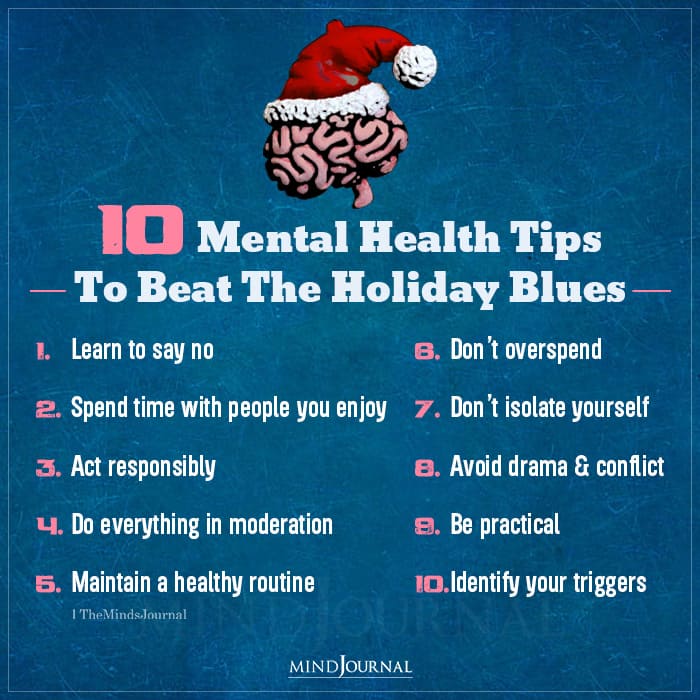
Talk to supportive friends or family members, engage in self-care activities or seek professional help if necessary. It is important to note that it is alright to have mixed feelings during this period and allowing ourselves to go through them helps us maintain our mental well-being.
Related: How To Cope With Anxiety And Depression During Christmas: 14 Ways To Bring Some Cheer
Holiday Stress and Mental Health
Apart from holiday blues mental health issues, holiday stress can also become more intense during this time of year. The pressure to have a perfect holiday season, manage finances and meet social pressures can be too much for most people.
Some ways this stress may manifest include being irritable, fatigued, having difficulty sleeping or even physical symptoms like headaches or stomach aches.
For effective management of holiday stress, it is vital that you prioritize taking care of yourself as well as setting achievable goals. Find time for activities that bring joy and peace in your life.
When dealing with mental health and holidays, apply mindfulness by being present in a moment so that you can maximize the experience derived therefrom. Additionally, setting boundaries and learning how to say no occasionally can help reduce the feeling of being overwhelmed.
Do not make these holidays an opportunity for you to tire yourself, but rather a moment to enjoy and connect.
Cultivating Positive Mental Health During the Holidays
In addition to holiday stress and mental health issues, holidays are significant in terms of personal growth, bonding and self-evaluation among others. Below are a number of practical ways that can help you take care of your mental health throughout this festive season:
1. Self-Care as a Priority
Do not forget yourself despite the busy activities during Christmas. Recharge with different energy renewing activities; read a book, go for walks along nature paths, meditate or even relax in a warm bath.
Note that self-care is not considered selfish but rather an important part of good mental health maintenance.
2. Set Realistic Expectations
As mental health and holidays are intricately linked, make sure to avoid putting pressure on yourself to have the perfect holiday season. Instead, remember that the most important thing is to spend time with loved ones, connect and make memories together.
Learn to embrace imperfection and let go of the need for everything to be perfect.
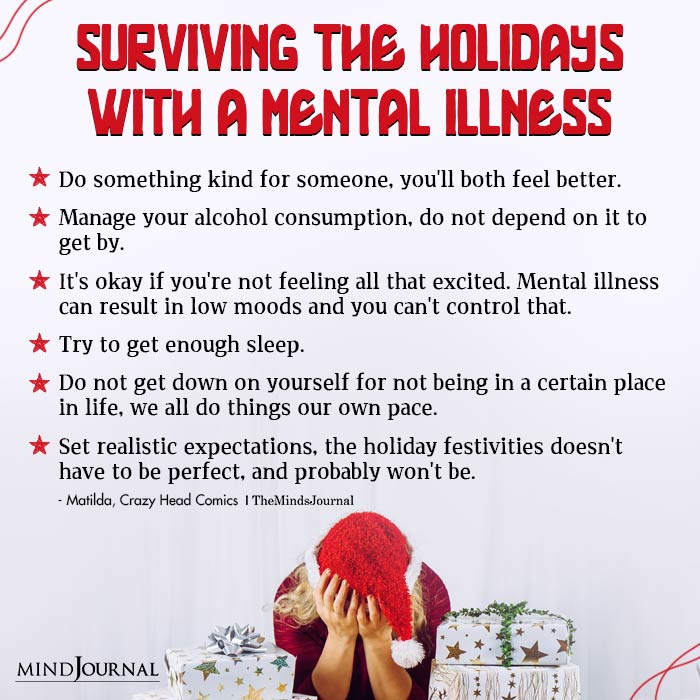
3. Practice Gratitude
You can learn gratitude principles and significantly improve your mental health. Just take a few minutes daily to consider all the things that make you grateful like a supportive friend, a cozy home or even an act of kindness towards others. Gratitude makes the holidays enjoyable.
Related: Feeling Depressed After the Holidays? 5 Reasons Why and How to Fix It
4. Seek Support
In case your mental health deteriorates with the coming of Christmas, do not hesitate to ask for assistance. Talk with people you trust such as friends or family members, or look at professional help from therapists or counselors and other forms of support available to you.
Keep in mind that asking for help means that you are strong and there is someone out there who can lend support.
5. Practice Mindful Consumption
The holiday season can be associated with excessive eating and drinking without considering our well-being. It does not mean we eat whatever we want without caring about what it could do to our overall health though.
Follow a healthy diet with essential nutrients, drink plenty of water and moderate alcohol intake within safe limits since physical wellness indirectly affects our mental fitness.
6. Connect with Others
Sometimes loneliness is particularly tough during holiday seasons. Try to connect with friends, family or community organizations where possible to build a positive association between mental health and holidays.
Attend social events, extend kindness to loved ones or maybe think about getting involved in some voluntary activities that will assist those in need of help the most. Connections and support from others are very important for one’s mental health.
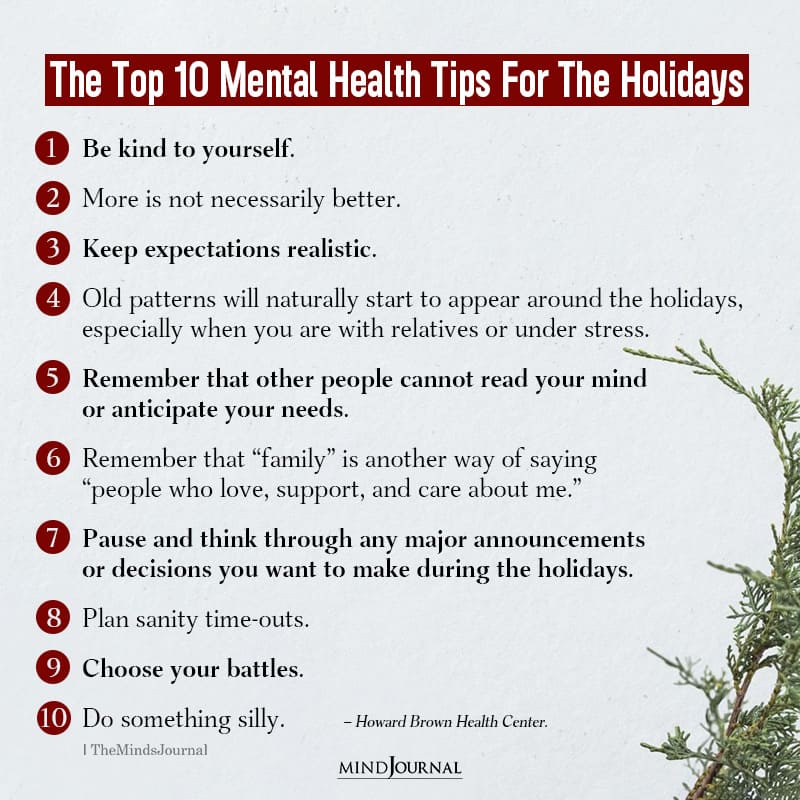
Takeaway
Let us all remember that during this festive season it is crucial to maintain good mental health conditions. Recognize, validate emotions; manage stress, ensure self-care too.
By understanding the relationship between mental health and holiday and by implementing strategies to nurture joy and manage stress, we can create a holiday season that is both meaningful and mentally enriching.
Never forget that taking care of your mind is important for a more joyful and fulfilling holiday experience for yourself and your loved ones.
Related: 5 Digital Wellness Tips For Disconnecting Over The Holidays
Frequently Asked Questions (FAQs):
How does holidays affect mental health?
The emotions of the holidays can have both positive and negative results on mental health brought about by pressure, being alone or unfulfilled expectations.
How does mental ill health impact on day to day living?
Mental illness can affect every aspect of life including feelings, connections, employment and physical welfare creating hurdles all around.
What stresses people out during the holidays?
Pressure during the holiday can come from buying gifts, family feuds, economic constraints as people travel and want a perfect holiday.

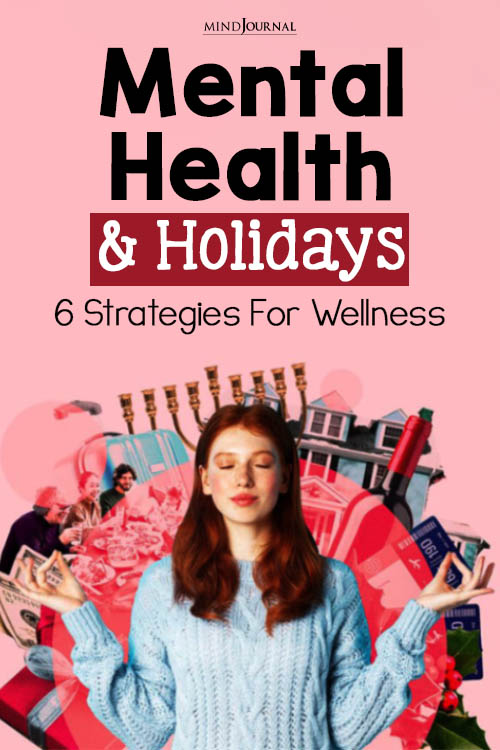
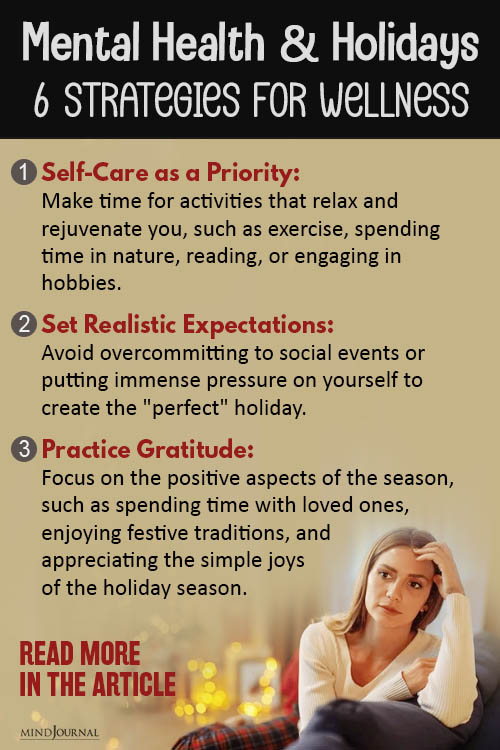









Leave a Reply